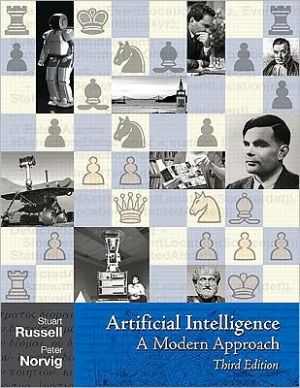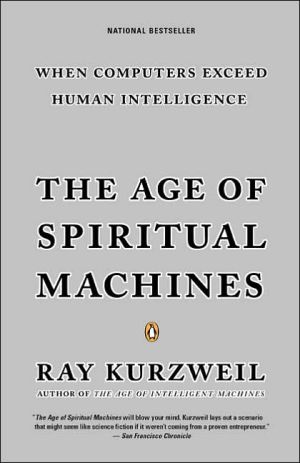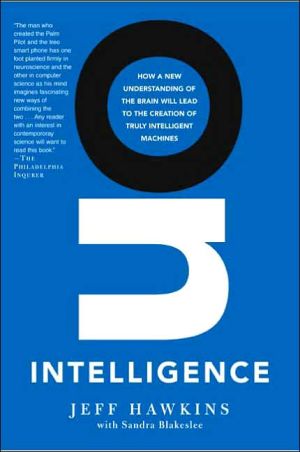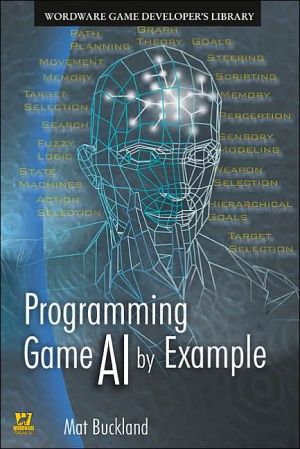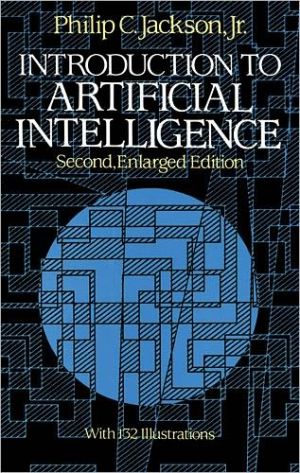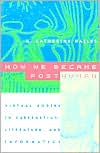Artificial Intelligence: A Modern Approach
Artificial Intelligence: A Modern Approach, 3e offers the most comprehensive, up-to-date introduction to the theory and practice of artificial intelligence. Number one in its field, this textbook is ideal for one or two-semester, undergraduate or graduate-level courses in Artificial Intelligence.\ Dr. Peter Norvig, contributing Artificial Intelligence author and Professor Sebastian Thrun, a Pearson author are offering a free online course at Stanford University on artificial intelligence.\...
Search in google:
This book uses an intelligent agent as the unifying theme throughout — i.e., the problem of AI is to describe and build agents that receive percepts from the environment and perform actions, and each such agent is implemented by a function that maps percepts to actions. covers different ways to represent these functions, such as production systems, reactive agents, logical planners and decision- theoretic systems explains the role of learning as extending the reach of the designer into unknown environments, and shows how it constrains agent design, favoring explicit knowledge representation and reasoning includes a thorough, up-to-date and integrated treatment of robotics and vision, written by John Canny and Jitendra Malik, two of the leading exponents in their respective fields analyzes basic techniques for addressing complexity (use of approximation, compilation, anytime algorithms, hierarchical abstraction) as general sources of power Covers areas that are sometimes under-emphasized— reasoning under uncertainty, learning, natural language, vision and robotics —and explains in detail some of the more recent ideas in the field —e.g., simulated annealing, memory-bounded search, global ontologies, dynamic belief networks, neural nets, inductive logic programming, computational learning theory, and reinforcement learning. Tackles AI's philosophical critics head-on. Gives equal emphasis to theory and practice—considers the basic concepts and mathematical methods of AI, what can and cannot be done with today's technology, at what cost, and using what techniques. Integrates state-of-the art AI techniques intointelligent agent designs, using examples and exercises to lead the student from simple, reactive agents to full knowledge-based agents with natural language capabilities. Includes over 75 algorithms, and a variety of simulated environments for testing agent designs. presents algorithms at three levels of detail — prose descriptions and pseudo-code in the text, and complete Common Lisp programs available by anonymous ftp or on floppy disk Includes numerous written and programming exercises in each chapter. Booknews a text primarily intended for use in an undergraduate course or course sequence. It shows how intelligent agents can be built using AI methods and explains how different agent designs are appropriate depending on the nature of the task and environment. It uses examples and exercises to lead students from simple reactive agents to advanced planning agents with natural language capabilities. Annotation c. Book News, Inc., Portland, OR (booknews.com)
IArtificial Intelligence1Intelligent Agents31IIProblem-solving53Solving Problems by Searching55Informed Search Methods92Game Playing122IIIKnowledge and reasoning149Agents that Reason Logically151First-Order Logic185Building a Knowledge Base217Inference in First-Order Logic265Logical Reasoning Systems297IVActing logically335Planning337Practical Planning367Planning and Acting392VUncertain knowledge and reasoning413Uncertainty415Probabilistic Reasoning Systems436Making Simple Decisions471Making Complex Decisions498VILearning523Learning from Observations525Learning in Neural and Belief Networks563Reinforcement Learning598Knowledge in Learning625VIICommunicating, perceiving, and acting649Agents that Communicate651Practical Natural Language Processing691Perception724Robotics773VIIIConclusions815Philosophical Foundations817AI: Present and Future842A Complexity analysis and O() notation851B Notes on Languages and Algorithms854Bibliography859Index905
\ Booknewsa text primarily intended for use in an undergraduate course or course sequence. It shows how intelligent agents can be built using AI methods and explains how different agent designs are appropriate depending on the nature of the task and environment. It uses examples and exercises to lead students from simple reactive agents to advanced planning agents with natural language capabilities. Annotation c. Book News, Inc., Portland, OR (booknews.com)\ \
